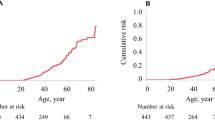Abstract
PURPOSE: An evaluation of the importance of gastrin in the colorectal carcinogenesis in patients with familial adenomatous polyposis was conducted. METHODS: Blood samples from 168 family members of 26 families were investigated for circulating gastrin. Blood was drawn from 65 affected patients, 66 clinically unaffected first-degree relatives, and 37 spouses. RESULTS: We did not find any difference in distribution of serum gastrin among these groups. CONCLUSION: Our results seem to exclude gastrin from being relevant in early carcinogenesis in patients with familial adenomatous polyposis.
Similar content being viewed by others
References
Bülow S. Clinical features of familial polyposis coli: results of the Danish polyposis register. Dis Colon Rectum 1986;29:102–7.
Groden J, Thilveris A, Samowitz W,et al. Identification and characterization of the familial adenomatous polyposis gene. Cell 1991;68:589–600.
Joslyn G, Carlson M, Thilveris A,et al. Identification of deletion mutations and three new genes at the familial polyposis locus. Cell 1991;68:601–13.
Bodmer WF, Bailey CJ, Bodmer J,et al. Localization of the gene for familial adenomatous polyposis on chromosome 5. Nature 1987;328:614–6.
Fearon ER, Vogelstein B. A genetic model for colorectal tumorigenesis. Cell 1990;61:759–67.
Stanbridge EJ. Identifying tumor suppressor genes in human colorectal cancer. Science 1990;247:12–3.
Tahara E. Growth factors and oncogenes in human gastrointestinal carcinomas. J Cancer Res Clin Oncol 1990;116:121–31.
Karlin DA, Mcbath M, Jones RD, Elwyn KE, Romsdal MM. Hypergastrinæmi and colorectal carcinogenesis in the rat. Cancer Letters 1985;29:73–8.
Winsett OE, Townsend CM, Glass EJ, Thompson JC. Gastrin stimulates growth of colon cancer. Surgery 1986;90:302–7.
Kusyk CJ, McNeil NO, Johnson LR. Stimulation of growth of a colon cancer cell line by gastrin. Am J Physiol 1986;251:G597–601.
Palmer Smith J, Solomon TE. Effects of gastrin, proglumide, and somatostatin on growth of human colon cancer. Gastroenterology 1988;95:1541–8.
Watson S, Durrant L, Morris D. Gastrin: growth enhancing effets on human gastric and colonic tumour cells. Br J Cancer 1989;59:554–8.
Palmer Smith J, Wood JG, Solomon TE. Elevated gastrin levels in patients with colon cancer or adenomatous polyps. Dig Dis Sci 1989;34:171–4.
Wong K, Beardshall K, Waters CM, Calan J, Poston GJ. Postprandial hypergastrinæmi in patients with colorectal cancer. Gut 1991;32:1352–4.
Charnley RM, Thomas WM, Stanley J, Morris DL. Serum gastrin concentrations in colorectal cancer patients. Ann R Coll Surg Engl 1992;74:138–41.
Rehfeld JF, Stadil F, Rubin B. Production and evaluation of antibodies for the radioimmunoassay of gastrin. Scand J Clin Lab Invest 1972;30:221–32.
Stadil F, Rehfeld JF. Preparation of125I-labelled synthetic human gastrin I for radioimmunoanalysis. Scand J Clin Lab Invest 1972;30:361–8.
Rehfeld JF, Stadil F. Gelfiltration studies on immunopositive gastrin in serum from Zollinger-Ellison patients. Gut 1973;14:369–73.
Rehfeld JF. Gastrins in serum. A review on gastrin radioimmunoaanalysis and the discovery of gastrin heterogeneity in serum. Scand J Gastroenterol 1973;8:577–83.
Stadil F, Rehfeld JF. Determination of gastrin in serum. Scand J Gastroenterol 1973;8:101–12.
Stadil F, Stage JG. Gastrinomas as model for duodenal ulcer disease. In: Rehfeld JF, Amdrup E, eds. Gastrins and the vagus. New York: Academic Press, 1979:199–210.
Suzuki H, Matsumoto K, Terashima H. Serum levels of gastrin in patients with colorectal neoplasia. Dis Colon Rectum 1988;31:716–7.
Christensen KC, Stadil F, Malmstrøm J, Rehfeld JF. The effect of beta-adrenergic and cholinergic blockade on the circadian rhythm of gastrins in serum. Scand J Gastroenterol 1978;13:263–72.
Goldschmiedt M, Barnett CC, Schwarts BE, Karnes WE, Redfern JS, Feldman M. Effect of age gastric acid secretion and serum gastrin concentrations in healthy men and women. Gastroenterology 1991;101:977–90.
Upp JR, Singh P, Townsend CM, Thompson JC. Clinical significance of gastrin receptors in human colon cancer. Cancer Res 1989;49:488–92.
Vogelstein B, Fearon ER, Kern SE,et al. Allelotype of colorectal cancer. Science 1989;244:207–11.
Sunday ME, Kaplan LM, Motoyama E, Chin WW, Spindel ER. Gastrin-releasing peptide (mammalian bombesin) gene expression in health and disease. Lab Invest 1988;59:5–24.
Fearon ER, Cho KR, Nigro JM,et al. Identification of a chromosome 18q gene that is altered in colorectal cancers. Science 1990;247:49–56.
Lund T, Geurts van Kessel AH, Haun S, Dixon JE. The genes for human gastrin and cholecystokinin are located on different chromosomes. Hum Genet 1986;73:77–80.
Vogelstein B, Fearon ER, Hamilton SR,et al. Genetic alterations during colorectal-tumor development. N Engl J Med 1988;319:525–32.
Luk GD, Baylin SB. Ornithine decarboxylase as a biological marker in familial colonic polyposis. N Engl J Med 1984;311:80–3.
Pegg AE, McCann PP. Polyamin metabolism and function. Am J Physiol 1982;243:C212–21.
Townsend CM, Beauchamp D, Thompson JC. Growth factors and intestinal neoplasms. Am J Surg 1988;155:526–36.
Upp JR, Saydjari R, Townsend CM, Singh P, Barranco SC, Thompson JC. Polyamine levels and gastrin receptors in colon cancers. Ann Surg 1988;207:662–9.
Arlow FL, Walczak SM, Moshier JA, Pietruk T, Majumdar AP. Gastrin and epidermal growth factor induction of ornithine decarboxylase in colonic explants. Life Sci 1990;46:777–84.
Majumdar AP. Role of tyrosine kinase in gastrin induction of ornithine decarboxylase in colonic mucosa. Am J Physiol 1990;259:G6:26–30.
Koo HB, Sigurdson ER, Daly JM, Berenson M, Groshen S, Decosse JJ. Ornithine decarboxylase levels in the rectal mucosa of patients with colonic neoplasia. J Surg Oncol 1988;38:240–3.
Hietala OA, Yum KY, Pilon J,et al. Proporties of ornithine decarboxylase in human colorectal adenocarcinomas. Cancer Res 1990;50:2088–94.
Author information
Authors and Affiliations
About this article
Cite this article
Svendsen, L.B., Bisgård, M.L., Gustafsen, J. et al. Serum gastrin values in patients with familial adenomatous polyposis. Dis Colon Rectum 37, 22–25 (1994). https://doi.org/10.1007/BF02047209
Issue Date:
DOI: https://doi.org/10.1007/BF02047209




